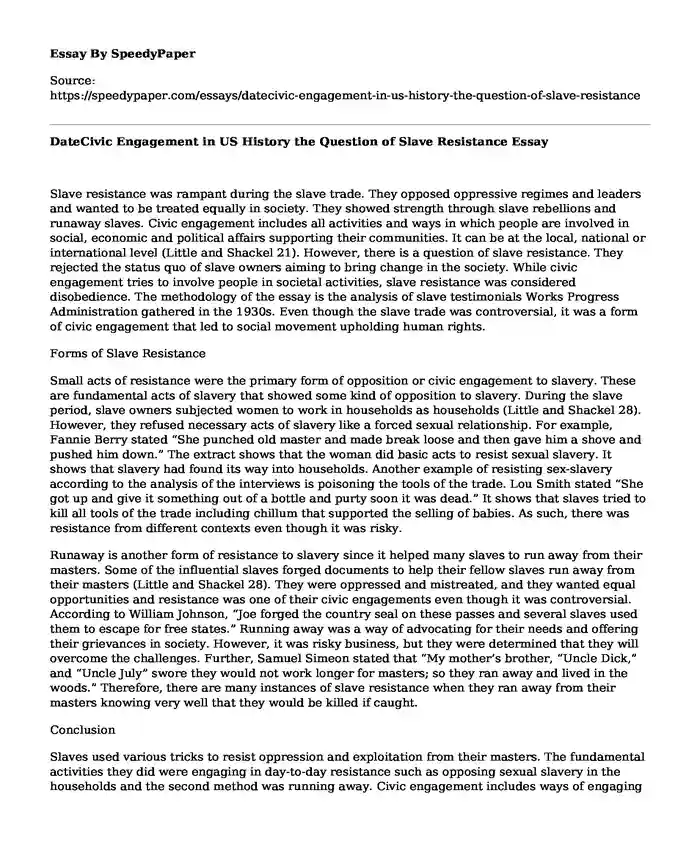Slave resistance was rampant during the slave trade. They opposed oppressive regimes and leaders and wanted to be treated equally in society. They showed strength through slave rebellions and runaway slaves. Civic engagement includes all activities and ways in which people are involved in social, economic and political affairs supporting their communities. It can be at the local, national or international level (Little and Shackel 21). However, there is a question of slave resistance. They rejected the status quo of slave owners aiming to bring change in the society. While civic engagement tries to involve people in societal activities, slave resistance was considered disobedience. The methodology of the essay is the analysis of slave testimonials Works Progress Administration gathered in the 1930s. Even though the slave trade was controversial, it was a form of civic engagement that led to social movement upholding human rights.
Forms of Slave Resistance
Small acts of resistance were the primary form of opposition or civic engagement to slavery. These are fundamental acts of slavery that showed some kind of opposition to slavery. During the slave period, slave owners subjected women to work in households as households (Little and Shackel 28). However, they refused necessary acts of slavery like a forced sexual relationship. For example, Fannie Berry stated "She punched old master and made break loose and then gave him a shove and pushed him down." The extract shows that the woman did basic acts to resist sexual slavery. It shows that slavery had found its way into households. Another example of resisting sex-slavery according to the analysis of the interviews is poisoning the tools of the trade. Lou Smith stated "She got up and give it something out of a bottle and purty soon it was dead." It shows that slaves tried to kill all tools of the trade including chillum that supported the selling of babies. As such, there was resistance from different contexts even though it was risky.
Runaway is another form of resistance to slavery since it helped many slaves to run away from their masters. Some of the influential slaves forged documents to help their fellow slaves run away from their masters (Little and Shackel 28). They were oppressed and mistreated, and they wanted equal opportunities and resistance was one of their civic engagements even though it was controversial. According to William Johnson, "Joe forged the country seal on these passes and several slaves used them to escape for free states." Running away was a way of advocating for their needs and offering their grievances in society. However, it was risky business, but they were determined that they will overcome the challenges. Further, Samuel Simeon stated that "My mother's brother, "Uncle Dick," and "Uncle July" swore they would not work longer for masters; so they ran away and lived in the woods." Therefore, there are many instances of slave resistance when they ran away from their masters knowing very well that they would be killed if caught.
Conclusion
Slaves used various tricks to resist oppression and exploitation from their masters. The fundamental activities they did were engaging in day-to-day resistance such as opposing sexual slavery in the households and the second method was running away. Civic engagement includes ways of engaging the society and slaves participated in these activities by combating slavery. It was controversial at the time, but it opened social movements that led to the liberation of people and observance of human rights.
Work Cited
Little, Barbara and Shackel, Paul. Archaeology, heritage, and civic engagement: Working toward the public good. Walnut Creek: Left Coast Press, 2014. Print.
Cite this page
DateCivic Engagement in US History the Question of Slave Resistance. (2023, Jan 09). Retrieved from https://speedypaper.net/essays/datecivic-engagement-in-us-history-the-question-of-slave-resistance
Request Removal
If you are the original author of this essay and no longer wish to have it published on the SpeedyPaper website, please click below to request its removal:
- Employee Wellness Programs - HRM Essay Example
- Free Essay Sample on Importance of Music to People
- Essay Example on Exemption of For-Profit Organizations from Affordable Care Act
- Essay Sample about Microsoft Branding Strategy
- Selfishness as an Inert Human Trait; Paper Outline Sample
- Essay Sample on Global Trends of Migrant Workers
- Essay Example on The Current Supply Chain for Palm Oil
Popular categories





